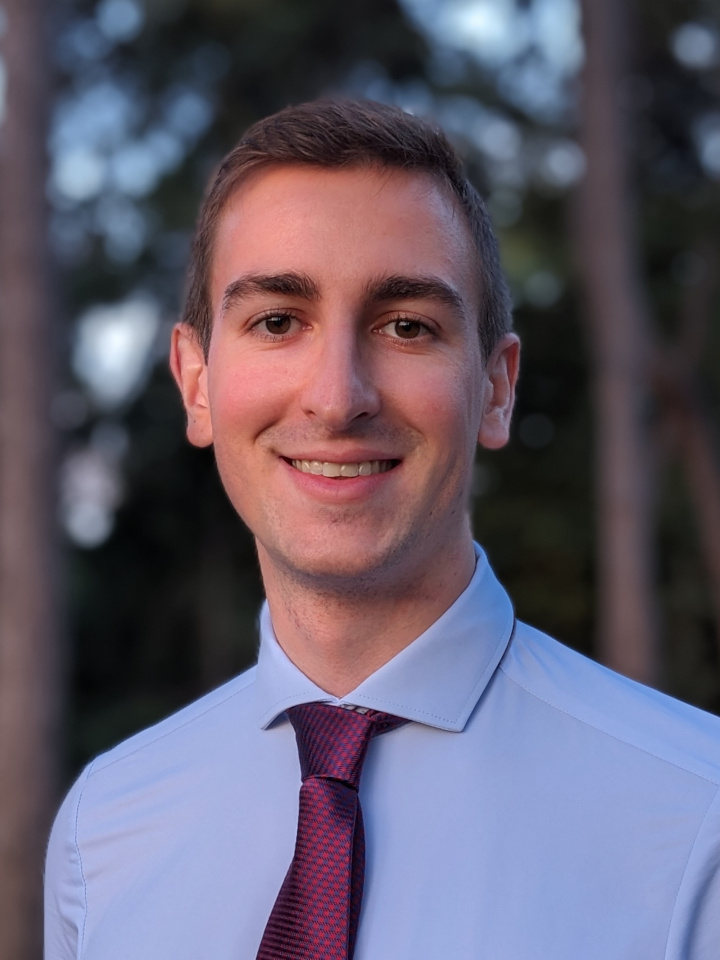About Me
I am a Hooke Research Fellow working in the Numerical Analysis Group at the University of Oxford and a Henslow Research Fellow on leave from Clare Hall within the University of Cambridge where I am affiliated with the Applied and Computational Analysis research group in the Department of Applied Mathematics and Theoretical Physics (DAMTP). My research interests cover a range of topics in applied and numerical analysis from wave scattering, over machine learning for scientific computing to low-regularity and geometric integration of time evolution equations. For more details please see my research page.
In addition, I am also the leader of the working group on Physics Informed Neural Networks (PINNs) withing Maths4DL and one of the group coordinators for the special interest group on Mathematical Analysis in Acoustics through the UK Acoustics Network Plus.
Previously I was a Marie Skłodowska-Curie postdoctoral fellow at Sorbonne Université (formerly Pierre and Marie Curie University) in Prof. Katharina Schratz's research group. My fellowship project was entitled GLIMPSE and concerned the development and study of Geometric and Low-regularity Integrators for the Matching and Preservation of Structure in the computation of dispersive Equations. I completed my PhD as a research scholar at Trinity College within the University of Cambridge under the supervision of Prof. Nigel Peake and Prof. Arieh Iserles.
Resume
A more detailed CV is available upon request.
Employment
Hooke Research Fellow, Mathematical Institute
Mar 2024 - presentUniversity of Oxford, UK
Henslow Research Fellow, Clare Hall
Nov 2023 - presentUniversity of Cambridge, UK
Marie Skłodowska-Curie Fellow, Laboratoire Jacques-Louis Lions
May 2022 - Oct 2023Sorbonne Université, France
Postdoctoral Researcher, Laboratoire Jacques-Louis Lions
Sep 2021 - April 2022Sorbonne Université, France
Education
University of Cambridge, Trinity College, UK
2017 - 2021PhD student in the Cambridge Centre for Analysis (CCA)
University of Cambridge, Trinity College, UK
2013 - 2017MMath (Part III in Mathematics) & BA (hons) in Mathematics
Honors and Awards
SIAM CS&E Hackathon Challenge Winner
Feb 2023SIAM Conference on Computational Science and Engineering, Netherlands
Marie Skłodowska-Curie Postdoctoral Fellowship
May 2022 - Oct 2023Marie Skłodowska-Curie Actions, European Commission
MathInGreaterParis Fellowship
Awarded Jan 2022Fondation Sciences Mathematiques de Paris & European Commission
Junior Research Leader at the Simons Semester 'Around transport and diffusion phenomena'
Dec 2021Institute for Mathematics, Polish Academy of Sciences & Simons Foundation
SIAM CS&E BGCE Prize Finalist
Mar 2021Bavarian Graduate School of Computational Engineering, Germany
Rouse Ball Travelling Studentship in Mathematics
Mar 2020Trinity College, University of Cambridge, UK
Smith-Knight & Rayleigh-Knight Prize
Mar 2019Faculty of Mathematics, University of Cambridge, UK
Election to Research Scholar
Oct 2017Trinity College, University of Cambridge, UK
Election to Senior Scholar
Oct 2016Trinity College, University of Cambridge, UK
Undergraduate Research Bursary
June 2016London Mathematical Society, UK
Winner TakeAIM competition
Nov 2015Smith Institute, UK
Election to Junior Scholar
Oct 2014Trinity College, University of Cambridge, UK
High School Student Award
Sept 2013Austrian Mathematical Society, Austria
Research
My main research interests focus on problems in computational mathematics for partial differential equations and the study of waves. In more detail I have worked on the following topics:
Numerical methods for evolution equations
A large part of my current ongoing research concerns the development and study of efficient numerical methods for time evolution equations. I have a particular interest in dispersive equations which arise for instance in the study of water waves, ferromagnetism and relativistic wave equations in particle physics and their approximation in low-regularity regimes. In this context I work with splitting methods, resonance-based methods and exponential integrators, and seek to better understand their properties including convergence rates for low-regularity data, cost and their efficient numerical implementation.
Geometric numerical integration
A particular focus of my recent research lies in the development of structure preserving algorithms in the context of dispersive Hamiltonian PDEs and resonance-based methods. In this work I aim to further develop theoretical guarantees on the behaviour of such methods including exact preservation of first integrals and long-time behaviour.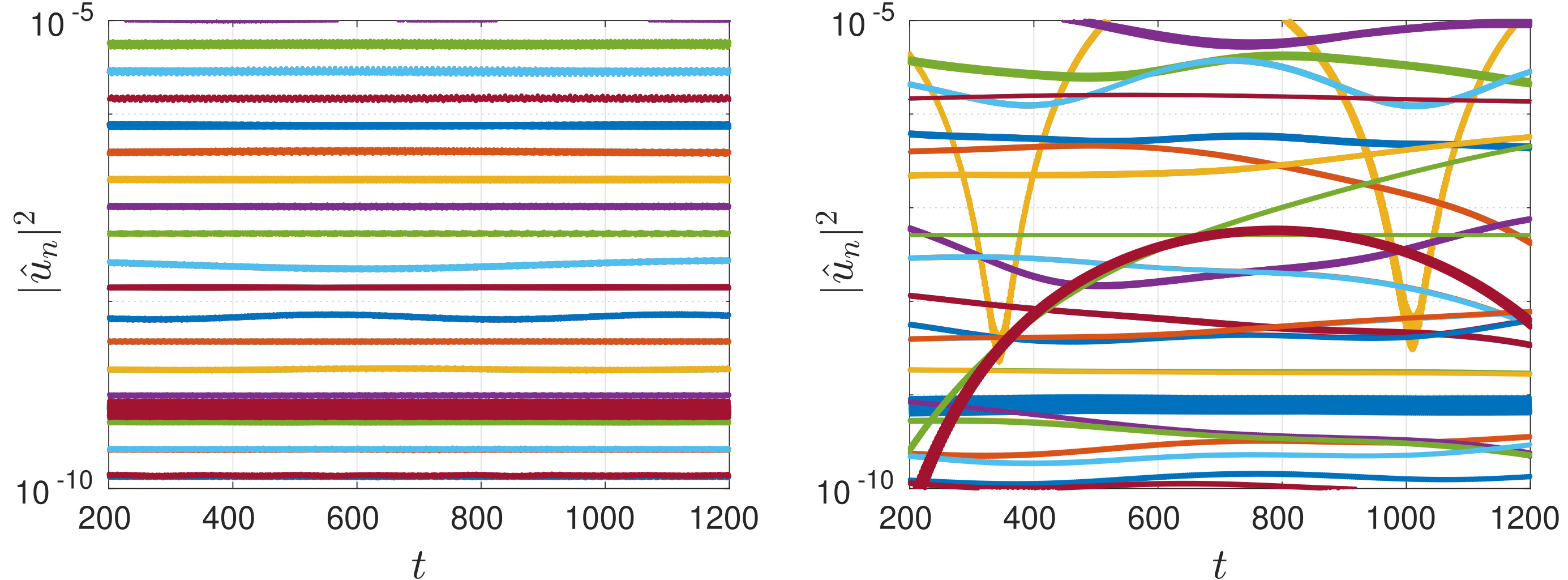
Analysis of collocation methods for Fredholm integral equations
In collaboration with Prof. Daan Huybrechs at KU Leuven, we are studying the theoretical properties of collocation methods for integral equations that arise in wave scattering. In particular we are interested in understanding the effect of the location and the number of collocation points on the error of the approximate solution. This work is motivated by results from signal analysis and approximation theory, where it was found that oversampling allows for improved robustness to redundancies in the approximation spaces. The understanding of the strengths and limitations of collocation methods is especially relevant to practical applications since in collocation methods are often easier to implement and cheaper to compute than their traditionally stabler counterpart, the Galerkin method.
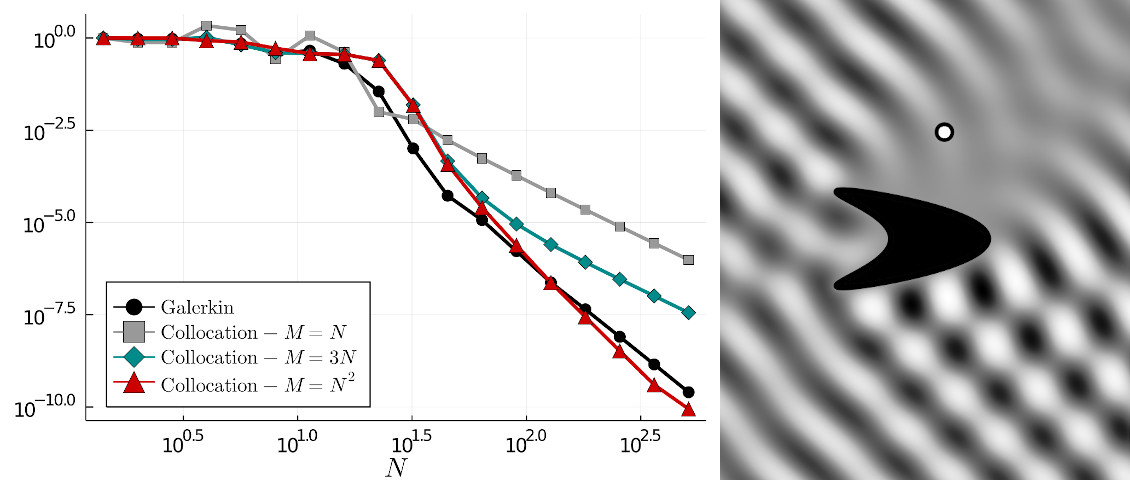
Computational high-frequency wave propagation
High-frequency wave scattering problems are beyond the reach of most conventional methods for numerical wave propagation due to the infeasible computational cost that large frequencies would require. As a result a significant amount of recent research has focussed on the development of hybrid numerical-asymptotic (HNA) methods, which are robust even for large frequencies and achieve in many cases a near frequency independent solution time. The underlying idea is to incorporate physical knowledge into numerical schemes to enhance quality and efficiency in the high-frequency regime, while preserving the precision and flexibility of a grid based approach. An essential step in boundary HNA methods is the numerical evaluation of highly oscillatory integrals. My current work focusses on the development of (provably) efficient quadrature methods for the specific types of oscillators and singularities encountered in boundary integral methods for computational wave scattering.
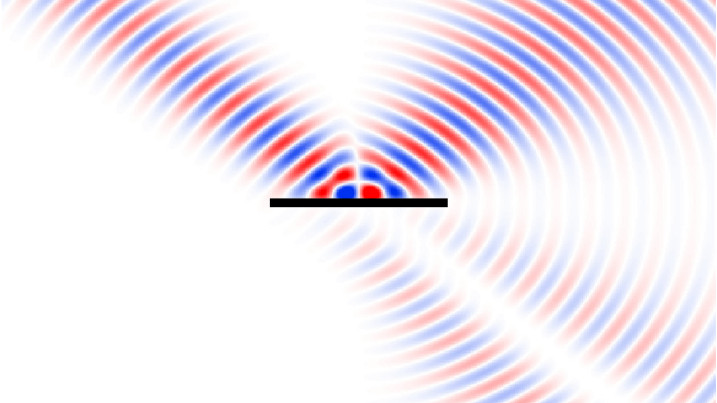
Wiener-Hopf method and applications
The Wiener-Hopf method is a very successful technique for solving certain boundary value problems which are relevant in acoustics, electromagnetic theory, hydrodynamics and elasticity. Typically the method exploits analyticity properties of Fourier half-line transforms combined with Liouville’s theorem to arrive at an explicit form of solution. I am currently applying this method to a specific model problem which arises from the need to understand noise development and propagation in turbofan engines.
The Wiener-Hopf method is a very successful technique for solving certain boundary value problems which are relevant in acoustics, electromagnetic theory, hydrodynamics and elasticity. Typically the method exploits analyticity properties of Fourier half-line transforms combined with Liouville’s theorem to arrive at an explicit form of solution. I am currently applying this method to a specific model problem which arises from the need to understand noise development and propagation in turbofan engines.
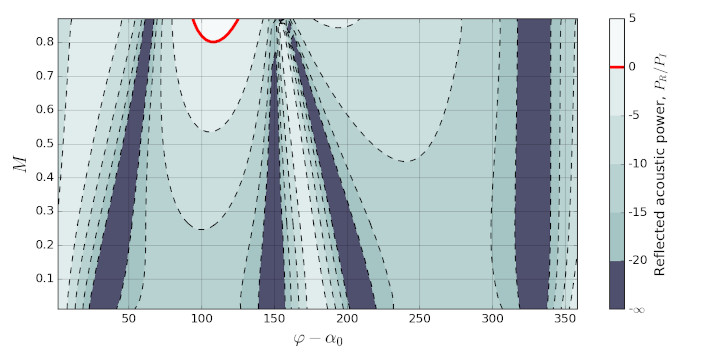
Publications
A fast neural hybrid Newton solver adapted to implicit methods for nonlinear dynamics.
Jin, T., Maierhofer, G., Schratz, K., Xiang, Y.
Download: preprint
G-Adaptive mesh refinement - leveraging graph neural networks and differentiable finite element solvers.
Rowbottom, J., Maierhofer, G., Deveney, T., Schratz, K., Lio, P., Schönlieb, C.-B., Budd, C.
Download: preprint
An accelerated Levin–Clenshaw–Curtis method for the evaluation of highly oscillatory integrals.
Maierhofer, G., Iserles, A.
Download: preprint
Symmetric resonance based integrators and forest formulae.
Alama Bronsard, Y., Bruned, Y., Maierhofer, G., Schratz, K.
Under review.
Download: preprint
Bridging the gap: symplecticity and low regularity in Runge-Kutta resonance-based schemes.
Maierhofer, G., Schratz, K.
Under review.
Download: preprint
Long-time error bounds of low-regularity integrators for nonlinear Schrödinger equations.
Feng, Y., Maierhofer, G., Schratz, K.
Mathematics of Computation.
Download: published version | preprint
Numerical integration of Schrödinger maps via the Hasimoto transform.
Banica, V., Maierhofer, G., Schratz, K.
SIAM Journal on Numerical Analysis.
Download: published version | preprint
Recursive moment computation in Filon methods and application to high-frequency wave scattering in two dimensions
Maierhofer, G., Iserles, A., Peake, N.
IMA Journal of Numerical Analysis.
Download: published version | preprint
An analysis of least-squares oversampled collocation methods for compactly perturbed boundary integral equations in two dimensions.
Maierhofer, G., Huybrechs, D.
Journal of Computational and Applied Mathematics (2022).
Download: published version | preprint
Convergence analysis of oversampled collocation boundary element methods in 2D
Maierhofer, G., Huybrechs, D.
Advances in Computational Mathematics (2022).
Download: published version | preprint
Acoustic and hydrodynamic power of wave scattering by an infinite cascade of plates in mean flow
Maierhofer, G., Peake, N.
Journal of Sound and Vibration (2021).
Download: published version | preprint
Wave scattering by an infinite cascade of non-overlapping blades
Maierhofer, G., Peake, N.
Journal of Sound and Vibration (2020).
Download: published version | preprint
Learning the Sampling Pattern for MRI
Sherry, F., Benning, M., De los Reyes, J. C., Graves, M. J., Maierhofer, G., Williams, G., Schönlieb, C.-B. and Ehrhardt, M.
IEEE Transactions on Medical Imaging (2020).
Download: published version | preprint
Mirror, Mirror, on the Wall, Who’s Got the Clearest Image of Them All? — A Tailored Approach to Single Image Reflection Removal
Heydecker, D., Maierhofer, G., Aviles-Rivero, A. I., Fan, Q., Chen, D., Schönlieb, C.-B. and Süsstrunk, S.
IEEE Transactions on Image Processing (2019).
Download: published version | preprint
Peekaboo - Where are the Objects? Structure Adjusting Superpixels.
Maierhofer, G., Heydecker, D., Aviles-Rivero, A. I., Alsaleh, S. M. and Schönlieb, C.-B.
25th IEEE International Conference on Image Processing (2018).
Download: published version | preprint
An extension of standard Latent Dirichlet Allocation to multiple corpora
Foster, A., Li, H., Maierhofer, G., Shearer, M.
SIAM Undergraduate Research Online Volume 9 (2016).
Download: published version
Geometric Measure of Arens Irregularity
Hernandez Palomares, R., Hu, E., Maierhofer, G. A., Rao, P.
Fields Institute for Research in Mathematical Sciences (2015).
Download: published version
Code
On this page you can find links to code associated with some of my research. If you have any questions regarding this, would like a demonstration or for suggestions of improvement and collaboration please feel free to get in touch.
Geometric low-regularity integrators (GLIMPSE)
This is part of my ongoing interest in the study of structure preserving low-regularity integrators for dispersive nonlinear equations which commenced with the Marie Skłodowska-Curie postdoctoral fellowship GLIMPSE. The theoretical results of this research are detailed in several publications which can be found here.
The associated code can be downloaded here: GitHub repository
Oversampling in boundary integral equations
In collaboration with Prof. Daan Huybrechs we have studied the effects of oversampling in collocation methods for boundary integral equations. A theoretical analysis describing the favorable properties of oversampling in this context can be found in two recent publications which are available here.
The associated code can be downloaded here: GitHub repository
Selected talks
Below is a list of some of my recent invited presentations, some of those with recording. If you saw one of my presentations and would like a copy of my slides please feel free to contact me.
Invited research talks
Structure-preserving low-regularity integrators for dispersive nonlinear equations
April 2024 | Link to recordingModern Methods for Differential Equations of Quantum Mechanics, BIRS, Canada
Computational methods for time-evolution equations
March 2024Cambridge Image Analysis group seminar, University of Cambridge, UK
Computing Schrödinger maps using the Hasimoto transform
August 2023Minisymposium on Numerical methods and analysis for dispersive PDEs, ICOSAHOM, South Korea
Analysis of oversampled collocation methods for wave scattering problems
February 2023Canonical scattering problems workshop, Isaac Newton Insitute, UK
Structure preserving low-regularity integrators for the Korteweg–De Vries and the nonlinear Schrödinger equations
July 202230th Birthday of Acta Numerica, Będlewo, Poland
Highly oscillatory quadrature and low-regularity integrators for nonlinear evolution equations
June 2022AMAC Seminar, Université Grenoble Alpes, France
Highly oscillatory quadrature and low-regularity integrators for nonlinear dispersive equations
April 2022Numerical Analysis Seminar, University of Bath, UK
How many observations are enough? - Convergence analysis of least-squares oversampled collocation methods for Fredholm integral equations
October 2021 | Link to recordingWorkshop – EPSRC Project on Transfer Operator Methods, University of Nottingham, UK
Outreach
I have had the privilege of being involved with several activities that sought to share the potential and the beauty of Mathematics with a wider audience, both within and outside of academia. Below are a few examples of those activities, which summarise also some of my main research interests for enthusiasts from other fields.
Selected activities
How physics can help AI learn about the real world
April 2024 | Link to podcastIn my collaboration with the Maths4DL working group on PINNs I was invited to join a podcast by the Maths Plus magazine discussing recent advances in machine learning for scientific computing.
Resonance-based schemes for low-regularity simulations of dispersive equations and beyond
July 2023 | Link to articleAs part of the ERC grant LAHACODE and my MSCA fellowship project GLIMPSE, Prof. Katharina Schratz and I wrote a brief article describing modern numerical methods for dispersive equations for the European Community on Computational Methods in Applied Sciences newsletter.
How Mathematics can help you sleep at night... - Overview of research in the Mathematical Analysis in Acoustics SIG
December 2021 | Link to slidesThis presentation contains an overview of ongoing mathematical research in the area of acoustics and was giving in my role as Early Career Representative in the Special Interest Group for Mathematical Analysis in Acoustics within UKAN+.
Contact Information
- Dr Georg Maierhofer
Mathematical Institute
University of Oxford
Woodstock Road
OX2 6GG Oxford
United Kingdom E-mail:
gam37[at]cam.ac.uk- Phone:
+44 (0)1865 273525
